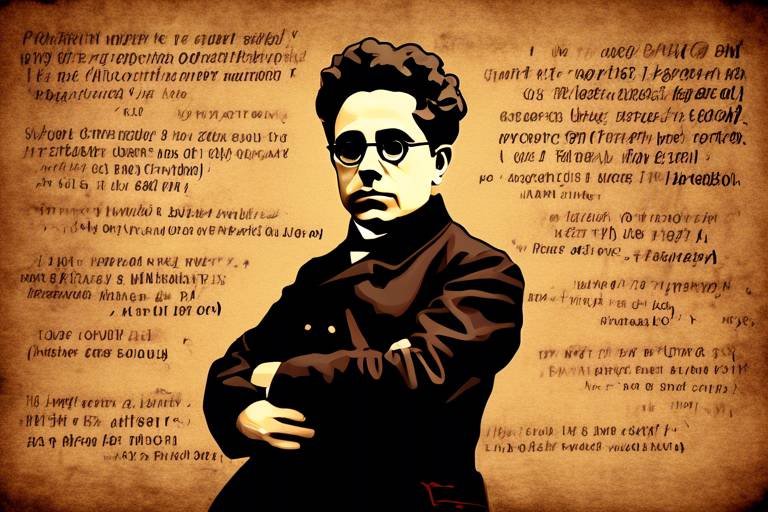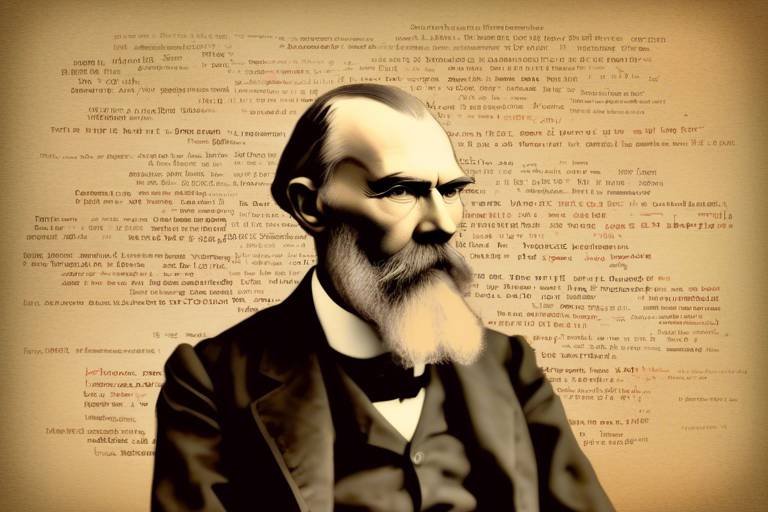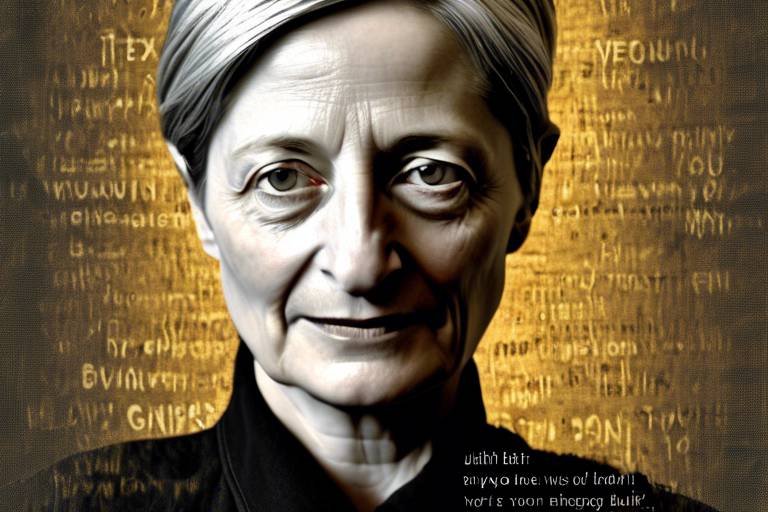Challenging Conventions - The Philosophy of Judith Butler
Judith Butler stands as a towering figure in the realms of feminist theory and queer studies, challenging us to rethink the very foundations of gender and identity. Her philosophy is not just an academic pursuit; it’s a radical reimagining of how we understand ourselves and each other in a world that often seeks to box us into rigid categories. Butler's work invites us to question the norms that govern our lives and to consider how these norms are constructed, maintained, and can be dismantled. It’s like peeling back the layers of an onion—each layer revealing the complexities and contradictions of our identities.
At the heart of Butler's philosophy is the concept of gender performativity, which posits that gender is not an innate quality but rather a series of repeated actions and performances. This idea flips the script on traditional notions of gender, suggesting that what we often take to be 'natural' is actually a social construct—an elaborate performance that we all participate in. Imagine gender as a theatrical play, where each of us is both an actor and an audience member, continuously shaping and reshaping the narrative of our identities. Butler's insights compel us to recognize that we have the power to change the script, to redefine our roles, and to challenge the expectations imposed upon us by society.
To fully appreciate the impact of Butler's work, it's essential to consider the historical context in which she writes. The evolution of feminist thought has been marked by significant socio-political movements that have shaped our understanding of gender and identity. Butler builds upon the foundations laid by earlier feminists, integrating and challenging their ideas to create a more nuanced discourse. This dialogue is not merely academic; it has real-world implications for how we engage with issues of gender and sexuality today.
Butler's intersection with queer theory is another vital aspect of her philosophy. Her ideas have expanded discussions around sexuality, pushing the boundaries of what it means to identify as queer. This intersectionality enriches contemporary queer activism and scholarship, providing a framework for understanding the complexities of identity in a world that often seeks to simplify it. By acknowledging the fluidity of gender and sexuality, Butler opens up new avenues for activism and social change, emphasizing that the fight for rights and recognition is deeply interconnected with broader struggles for justice.
However, Butler's work is not without its critiques. Scholars and activists alike have raised questions about the implications of her theories, particularly concerning their accessibility and practical application. These critiques spark important conversations within academic and activist circles, challenging us to refine our understanding of identity and the mechanisms of oppression. Engaging with these critiques is crucial, as it allows us to strengthen the foundations of Butler's philosophy and ensure its relevance in ongoing discussions about gender and sexuality.
Ultimately, Judith Butler's philosophy extends far beyond the confines of academia; it resonates deeply within contemporary social justice movements. Her ideas have become a rallying cry for those advocating for trans rights and recognition, providing a theoretical backbone for the fight against discrimination and marginalization. Butler's emphasis on intersectionality highlights the interconnectedness of various identities, urging us to consider how race, class, and sexuality converge to shape our experiences of oppression and resistance.
In conclusion, the legacy of Judith Butler is profound and far-reaching. Her contributions to philosophy, feminism, and queer studies continue to inspire new generations of thinkers and activists. As we navigate the complexities of identity and resistance in our current sociopolitical landscape, Butler's insights remind us of the power we hold to challenge conventions, redefine our identities, and advocate for a more inclusive and equitable society.
- What is Judith Butler's main contribution to gender theory?
Judith Butler's main contribution is the concept of gender performativity, which argues that gender is a series of actions and performances rather than an inherent trait. - How does Butler's work influence contemporary activism?
Butler's work informs contemporary activism by challenging traditional norms surrounding gender and sexuality, providing a theoretical framework for social justice movements. - What critiques does Butler face regarding her theories?
Critics often question the accessibility and practical application of Butler's theories, prompting important discussions about their relevance in real-world contexts. - How does Butler's philosophy intersect with queer theory?
Butler's philosophy intersects with queer theory by expanding discussions around sexuality and identity, enriching contemporary queer activism and scholarship.

Introduction to Judith Butler
Judith Butler is a pivotal figure in feminist theory and queer studies, renowned for her profound contributions that challenge the very fabric of traditional gender norms. Born in 1956, Butler's intellectual journey has reshaped how we perceive identity, gender, and the societal constructs that govern our lives. Her work is not just academic; it is a call to action, urging us to rethink and deconstruct the roles we often take for granted. Imagine a world where gender is not a fixed attribute but a fluid performance—this is the revolutionary perspective Butler brings to the table.
Butler's groundbreaking book, Gender Trouble, published in 1990, introduced the concept of gender performativity, which posits that gender is not something we are, but something we do. This idea has profound implications: it means that our identities are shaped through repeated actions and societal performances rather than innate characteristics. This shift in understanding invites us to consider how our daily behaviors and societal expectations construct our identities. It's like being an actor on a stage, where the script is written by cultural norms and societal pressures.
Her work does not exist in a vacuum; it is deeply rooted in the historical context of feminist thought and the socio-political movements that have shaped our current understanding of identity. Butler draws from a rich tapestry of feminist theory, integrating and challenging earlier ideas to create a more nuanced discourse. For instance, she engages with the works of Simone de Beauvoir and Michel Foucault, weaving their insights into her own theories. This intertextuality not only enriches her arguments but also situates her work within a broader dialogue about power, identity, and resistance.
In addition, Butler's philosophy intersects significantly with queer theory, expanding discussions around sexuality and identity. By questioning the binary understanding of gender, she opens up new avenues for exploring the complexities of human experience. Her ideas have sparked a wave of contemporary queer activism and scholarship, encouraging individuals to embrace their identities beyond societal labels. In essence, Butler invites us to celebrate the diversity of human experience and to recognize that our identities are multifaceted, shaped by a myriad of influences.
As we delve deeper into Butler's philosophy, it becomes clear that her work is not merely theoretical; it has real-world implications. Her ideas inform contemporary social justice movements, particularly in the realms of gender and sexuality. Butler's legacy is one of challenging conventions and advocating for a more inclusive understanding of identity, making her an essential figure in today's discourse on social justice.

Gender Performativity
Judith Butler's concept of has revolutionized our understanding of gender and identity. Rather than viewing gender as a fixed attribute, Butler argues that it is a performance—an ongoing series of actions, behaviors, and societal interactions that create the illusion of a stable identity. This groundbreaking idea challenges the traditional notion that gender is something one is born into, suggesting instead that it is something one does. Imagine gender as a theatrical performance, where each individual plays a role shaped by cultural expectations and social norms. Just as an actor embodies a character, individuals express their gender through repeated performances, reinforcing or subverting societal conventions.
Butler's work draws upon the influence of various philosophical traditions, including existentialism and post-structuralism, to argue that our identities are not innate but are constructed through our actions. This perspective invites us to reconsider how we understand gender roles and the ways in which they are socially enforced. For instance, when society expects men to be assertive and women to be nurturing, these expectations shape how individuals perform their gender. It's a bit like a dance: the steps may be dictated by cultural norms, but each dancer can choose how to interpret and express those steps.
To further illustrate this concept, consider the following table, which highlights the distinctions between traditional views of gender and Butler's performative approach:
| Traditional View of Gender | Butler's Gender Performativity |
|---|---|
| Gender is biologically determined | Gender is socially constructed through performance |
| Fixed roles based on sex | Fluid roles that can change over time |
| Identity is static | Identity is dynamic and evolving |
Butler's ideas have far-reaching implications, not only for individuals navigating their own identities but also for society as a whole. By recognizing that gender is performative, we open the door to greater flexibility in how we understand and express our identities. This recognition can lead to a more inclusive society, where diverse expressions of gender are not only accepted but celebrated. However, this also raises important questions: What happens when individuals do not conform to traditional gender performances? How do societal structures respond to those who challenge the norms?
Ultimately, Butler's theory of gender performativity invites us to reflect critically on our own performances and the roles we play in society. It encourages a deeper understanding of how our actions contribute to the construction of gender norms and how we might challenge those norms to create a more equitable world. In a society that often seeks to box individuals into rigid categories, Butler's philosophy serves as a liberating force, reminding us that we are all capable of redefining our identities through our choices and actions.

Historical Context
To truly appreciate Judith Butler's groundbreaking contributions to gender theory, we must first delve into the that shaped her ideas. The late 20th century was a tumultuous time for feminist thought, marked by significant social upheaval and a burgeoning awareness of diverse identities. The feminist movements of the 1960s and 1970s laid the groundwork for Butler's theories, as they challenged traditional notions of gender and sought to dismantle the patriarchal structures that governed society.
During this period, several key events and movements influenced Butler’s thinking:
- The Second Wave Feminism: This movement, emerging in the 1960s, focused on issues such as reproductive rights, workplace equality, and sexual liberation. It was pivotal in reshaping societal views on women's roles and rights.
- The LGBTQ+ Rights Movement: As homosexuality began to be recognized as a legitimate identity rather than a pathology, discussions surrounding gender and sexuality gained momentum. The Stonewall Riots of 1969 became a catalyst for queer activism, which Butler would later engage with deeply.
- Post-Structuralism: Thinkers like Michel Foucault and Jacques Derrida challenged the idea of fixed identities, emphasizing the fluidity of meaning and the role of power in shaping social norms. This philosophical backdrop was crucial for Butler's development of the concept of gender as performative.
Butler's work does not exist in a vacuum; it is a response to and a critique of these evolving ideas. Her seminal text, Gender Trouble, published in 1990, emerged as a revolutionary challenge to the established feminist narratives of the time. By asserting that gender is not a stable identity but rather a series of acts and performances, Butler questioned the very foundations on which gender norms were built.
Furthermore, the intersection of feminism and queer theory in Butler's work reflects a broader shift in social consciousness. As activists began to recognize the limitations of a binary understanding of gender, Butler's ideas provided a framework for exploring the complexities of identity. This historical context is essential for understanding how Butler's philosophy not only critiques existing paradigms but also offers new pathways for thinking about gender and identity in a rapidly changing world.

Influence of Feminism
Judith Butler's work is deeply rooted in the rich tapestry of feminist thought, and her theories have significantly reshaped the landscape of feminist discourse. To fully appreciate Butler's contributions, it’s essential to recognize how she builds upon, critiques, and transforms earlier feminist ideas. Feminism, as a movement, has evolved through various waves, each addressing different aspects of gender inequality and identity. Butler’s philosophy, particularly her concept of gender performativity, challenges the very foundations of how we understand gender identity.
In the early waves of feminism, the focus was primarily on legal rights and equality in the public sphere. Think of the suffragettes fighting for the right to vote or the second-wave feminists advocating for workplace equality. However, Butler pushes this conversation further by arguing that gender is not just about social roles or legal rights; it is a performative act that is constantly being enacted and re-enacted. This perspective shifts the conversation from merely seeking equality to questioning the very categories of 'male' and 'female' themselves.
Butler's work encourages a more nuanced understanding of gender, one that acknowledges the fluidity and complexity of identity. She asserts that gender is not something one is, but rather something one does. This idea can be likened to a dance—each performance is unique, influenced by context, culture, and individual expression. By framing gender as performance, Butler opens the door to a broader spectrum of identities that fall outside traditional binary classifications.
Moreover, Butler's influence extends to the intersection of feminism and queer theory. She challenges the heteronormative assumptions that have historically dominated feminist discourse. By doing so, she not only amplifies the voices of LGBTQ+ individuals within feminist spaces but also highlights the importance of inclusivity in discussions about gender and sexuality. This intersectional approach is vital for understanding the diverse experiences of individuals who navigate multiple identities.
To better illustrate Butler's influence on feminism, consider the following table that summarizes key contributions:
| Feminist Wave | Focus | Butler's Contribution |
|---|---|---|
| First Wave | Legal rights (e.g., suffrage) | Questions the binary view of gender |
| Second Wave | Workplace equality, reproductive rights | Introduces the concept of gender performativity |
| Third Wave | Diversity of identities and experiences | Emphasizes fluidity and intersectionality |
In summary, Butler's influence on feminism is profound and multifaceted. Her theories challenge traditional notions of gender, pushing for a more inclusive understanding that recognizes the complexities of identity. By integrating and critiquing earlier feminist ideas, Butler not only expands the conversation but also lays the groundwork for future generations to explore the intricacies of gender and sexuality in a more liberated and nuanced manner.
- What is gender performativity? Gender performativity is the idea that gender is not an inherent trait but rather a series of actions and performances that individuals enact based on societal norms.
- How has Judith Butler influenced contemporary feminism? Butler has reshaped feminist discourse by challenging binary notions of gender and emphasizing the fluidity of identity, which has broadened the scope of feminist thought.
- What role does intersectionality play in Butler's philosophy? Intersectionality in Butler's thought highlights the interconnectedness of various identities, enriching our understanding of social justice issues and advocating for inclusivity.

Queer Theory Intersection
Judith Butler's philosophy does not exist in a vacuum; rather, it intricately weaves into the fabric of queer theory, creating a rich tapestry of ideas that challenge normative understandings of identity and sexuality. At its core, Butler’s work invites us to reconsider the very foundations of how we perceive gender and sexual orientation. Instead of viewing these categories as fixed and binary, she posits that they are fluid and performative. This perspective is revolutionary, as it allows for the possibility of multiple identities and experiences, reflecting the complexity of human existence.
Butler's intersection with queer theory is particularly significant because it broadens the scope of discussion around sexuality. Traditional frameworks often limit our understanding to heterosexual norms, sidelining the experiences of queer individuals. However, Butler’s insights push us to acknowledge that gender and sexuality are not merely about who we love or how we identify; they are about the performances we enact in our daily lives. This notion of performativity suggests that our identities are not inherent but are instead constructed through repeated actions and societal expectations.
As we delve deeper into Butler's influence on queer theory, it becomes clear that her ideas have sparked critical conversations around issues such as:
- Fluidity of Identity: Emphasizing that identities are not static but evolve over time.
- Challenging Heteronormativity: Questioning the societal norms that prioritize heterosexual relationships and identities.
- Expanding the LGBTQ+ Discourse: Encouraging a more inclusive understanding of queer identities beyond binary classifications.
Moreover, Butler’s work has paved the way for contemporary queer activism, inspiring movements that fight against the marginalization of non-binary and transgender individuals. Her theories encourage activists to challenge not only the legal frameworks that restrict rights but also the cultural narratives that shape our understanding of gender and sexuality. In this sense, Butler’s philosophy is not just theoretical; it serves as a powerful tool for advocacy and social change.
In summary, the intersection of Butler's philosophy with queer theory is a dynamic and essential aspect of her work. It invites us to rethink our preconceived notions of identity, urging us to embrace a more inclusive and expansive view of human experience. By doing so, Butler not only enriches academic discourse but also galvanizes social movements aimed at achieving equality and justice for all individuals, regardless of their gender or sexual identity.

Critiques of Butler's Work
Judith Butler's groundbreaking theories have not gone without scrutiny. While her ideas have undoubtedly reshaped the landscape of feminist and queer studies, several critiques have emerged from various quarters. One of the primary criticisms revolves around the concept of gender performativity. Critics argue that Butler's assertion that gender is a performance may oversimplify the complex realities of individuals who experience gender dysphoria or those who feel deeply connected to their gender identity. For some, gender is not merely a series of acts but a core aspect of their existence.
Another significant critique involves the accessibility of Butler's writing. Many scholars and activists have pointed out that her work can be dense and laden with jargon, making it challenging for those outside academic circles to engage with her ideas. This concern raises an important question: if the language of theory is so esoteric, does it alienate the very people who might benefit from her insights? In this sense, Butler's work may inadvertently perpetuate a divide between academic discourse and grassroots activism.
Furthermore, some argue that Butler's focus on performativity can lead to a form of relativism that undermines the material realities of oppression. For instance, while Butler emphasizes the fluidity of gender, critics contend that this perspective might overlook the tangible consequences of rigid gender norms that disproportionately affect marginalized communities. This critique suggests that while Butler's theories are important, they should be complemented by a more grounded understanding of how gender operates in real-world contexts.
Despite these critiques, Butler's responses often reflect a deep engagement with her critics. She acknowledges the complexities surrounding identity and the need for ongoing dialogue. In fact, Butler has emphasized that her work is not meant to provide definitive answers but rather to provoke thought and discussion. This willingness to engage with criticism is a testament to her commitment to the evolution of thought within feminist and queer discourse.
To summarize, while Judith Butler's contributions to gender theory and feminist thought are monumental, they are not without their challenges. The critiques of her work serve as a reminder of the dynamic nature of academic discourse, where ideas must continually be tested, debated, and refined. As Butler herself might argue, the very act of critiquing her theories is a performance of intellectual engagement, highlighting the ongoing struggle for understanding in the complex realm of identity.
- What is gender performativity? Gender performativity is the idea that gender is not an inherent trait but rather a series of actions and performances that individuals enact in their daily lives.
- How has Judith Butler influenced feminist theory? Judith Butler has challenged traditional notions of gender and identity, reshaping feminist discourse by introducing concepts like performativity and emphasizing the fluidity of gender.
- What are some common critiques of Butler's work? Common critiques include the accessibility of her writing, the potential oversimplification of gender identity, and the risk of relativism that may overlook material realities of oppression.
- How does Butler's work relate to social justice movements? Butler's theories inform contemporary social justice movements by challenging norms related to gender and sexuality, advocating for recognition and rights for marginalized communities.

Implications for Social Justice
Judith Butler’s philosophy is not just a theoretical exercise confined to the ivory towers of academia; it has profound implications for social justice movements around the globe. Her work challenges us to rethink the very foundations of identity and normativity, pushing boundaries that have historically marginalized individuals based on gender and sexuality. At its core, Butler's philosophy advocates for a world where identities are fluid and constructed through performative acts, rather than rigid categories imposed by society. This perspective encourages activists to question and dismantle the systemic structures that perpetuate inequality.
One of the most significant areas influenced by Butler’s work is the advocacy for trans rights. Her arguments not only support the recognition of diverse gender identities but also challenge the binary understanding of gender itself. By asserting that gender is performative, Butler empowers trans individuals to reclaim their identities and assert their rights in a society that often seeks to erase them. This has led to a broader conversation about the importance of visibility and representation in all spheres of life, from politics to media. In fact, many contemporary movements for trans rights draw directly from Butler's insights, illustrating how her theories translate into real-world action.
Additionally, Butler’s emphasis on intersectionality is crucial for understanding social justice. She acknowledges that identities do not exist in isolation; rather, they intersect and interact in complex ways that shape individual experiences of oppression and privilege. This intersectional approach is vital for activists who seek to address the nuanced realities faced by marginalized communities. For example, the struggles of a Black trans woman are informed not just by her gender identity but also by her race, socioeconomic status, and other factors. Recognizing these intersections allows for a more comprehensive and effective approach to advocacy, ensuring that no one is left behind in the quest for justice.
To illustrate the interconnectedness of these issues, consider the following table that highlights key areas where Butler's philosophy intersects with contemporary social justice movements:
| Social Justice Area | Butler's Influence | Real-World Implications |
|---|---|---|
| Trans Rights | Challenges binary gender norms | Increased visibility and policy changes |
| Feminism | Redefines gender roles | Broader inclusion of diverse identities |
| Queer Activism | Expands discussions of sexuality | Greater acceptance and rights for LGBTQ+ individuals |
| Intersectionality | Highlights interconnected identities | More holistic approaches to advocacy |
In conclusion, Butler's work serves as a powerful tool for social justice advocates, providing a framework that not only critiques existing norms but also inspires action. By embracing her philosophy, activists can foster a more inclusive society that recognizes and values the complexity of human identity. In a world where the fight for equality continues to evolve, Butler’s ideas remind us that the struggle for justice is deeply intertwined with our understanding of who we are and how we relate to one another.
- What is gender performativity? Gender performativity is the concept that gender is not an innate quality but rather something that is enacted through repeated behaviors and performances.
- How does Butler's work influence trans rights? Butler’s theories provide a foundation for understanding and advocating for diverse gender identities, emphasizing the need for recognition and representation.
- What does intersectionality mean in Butler's philosophy? Intersectionality refers to the interconnected nature of social categorizations such as race, class, and gender, which can create overlapping systems of discrimination or disadvantage.
- Why is Butler's work important for social justice? Her ideas challenge traditional norms and empower marginalized voices, making them essential for contemporary activism and advocacy efforts.

Trans Rights Advocacy
Judith Butler's work has profoundly influenced the landscape of . Her theories challenge the rigid boundaries of gender identity, encouraging a more fluid and inclusive understanding of what it means to be transgender. By asserting that gender is a performance rather than a fixed category, Butler opens the door for a more nuanced dialogue about the rights and recognition of trans individuals. This perspective not only validates the experiences of trans people but also serves as a powerful critique against societal norms that seek to pigeonhole individuals into binary gender roles.
One of the key aspects of Butler's philosophy is the idea that identity is constructed through repeated actions. This notion is particularly relevant in the context of trans rights, as it emphasizes the importance of personal agency in defining one's own identity. Trans individuals are not merely reacting to societal expectations; rather, they are actively engaging in the performance of their gender, thus reshaping the very fabric of societal norms. This shift in understanding is crucial for advocating for policies that protect and affirm the rights of trans people.
In practical terms, Butler's ideas have inspired numerous movements and organizations dedicated to trans rights. These groups often focus on several critical areas:
- Legal Recognition: Advocating for laws that allow individuals to change their gender markers on identification documents.
- Healthcare Access: Ensuring that trans individuals have access to gender-affirming healthcare without discrimination.
- Social Acceptance: Promoting awareness and understanding of trans issues within communities to reduce stigma and violence.
Butler's emphasis on the performative aspect of gender also highlights the need for intersectionality within trans rights advocacy. Recognizing that race, class, and other identities intersect with gender can lead to a more comprehensive approach to advocacy. For instance, trans people of color often face unique challenges that require targeted efforts. By incorporating intersectionality into discussions of trans rights, advocates can address the specific needs of marginalized groups, ultimately fostering a more inclusive movement.
Moreover, Butler's critiques of traditional gender norms have sparked important conversations about the role of language in shaping our understanding of gender. The use of inclusive language, such as gender-neutral pronouns, is a direct response to Butler's call for a rethinking of how we communicate about identity. This shift not only validates the experiences of non-binary and genderqueer individuals but also serves to expand the conversation surrounding gender beyond the binary framework.
As we look to the future, the implications of Butler's work for trans rights advocacy remain profound. Her insistence on the fluidity of identity encourages ongoing dialogue and activism that challenges the status quo. By embracing the complexities of gender and advocating for the rights of all individuals, we can create a society that not only recognizes but celebrates diversity in gender expression.
- What is Judith Butler's main contribution to trans rights?
Butler's work emphasizes that gender is a performance, advocating for the recognition of fluid and diverse gender identities, which has significantly influenced trans rights activism. - How does Butler's philosophy impact social justice movements?
Butler's ideas encourage a more inclusive approach to social justice, ensuring that the intersectionality of identities is considered in advocacy efforts. - What role does intersectionality play in trans rights advocacy?
Intersectionality highlights how various identities, such as race and class, intersect with gender, leading to a more comprehensive understanding of the challenges faced by trans individuals.

Intersectionality in Butler's Thought
Judith Butler’s philosophy profoundly emphasizes the concept of intersectionality, which refers to the way different social identities—such as race, gender, class, and sexuality—interact and intersect to shape individual experiences and systemic inequalities. Butler argues that to fully understand identity, one must recognize how these various factors coexist and influence one another. It's like trying to understand a complex tapestry; each thread represents a different aspect of identity, and when woven together, they create a unique pattern that reflects the multifaceted nature of human experience.
In her work, Butler challenges the notion of a singular identity, proposing that individuals are not defined by a single characteristic but rather by a constellation of identities that inform their experiences and struggles. This perspective is crucial in contemporary discussions about social justice, as it highlights the importance of acknowledging and addressing the unique challenges faced by individuals at the intersections of multiple identities. For instance, the experiences of a Black transgender woman cannot be fully understood by examining race or gender in isolation; instead, it requires an appreciation of how these identities intersect to create specific societal challenges.
Moreover, Butler’s emphasis on intersectionality serves as a call to action for activists and scholars alike. It encourages a more inclusive approach to social justice, urging movements to consider the diverse experiences of individuals who may be marginalized in various ways. This is particularly relevant in today’s world, where social justice movements are increasingly recognizing the need for intersectional frameworks to address complex issues effectively. By incorporating intersectionality into activism, movements can better advocate for policies and practices that reflect the realities of all individuals, not just those who fit within a narrow definition of identity.
To illustrate the significance of intersectionality in Butler's thought, consider the following table that outlines the key components of intersectionality and their implications:
| Component | Description | Implications |
|---|---|---|
| Identity | Understanding that individuals possess multiple identities | Challenges monolithic views of identity |
| Interconnectedness | Recognizing how different identities interact | Encourages comprehensive approaches to social issues |
| Marginalization | Acknowledging the unique struggles faced by those at intersections | Promotes inclusivity in activism and policy-making |
In summary, Butler's exploration of intersectionality enriches our understanding of identity and social justice by emphasizing the complexity of human experiences. It serves as a reminder that in the quest for equality, we must consider the whole person, understanding that their struggles are shaped by a multitude of factors. This holistic approach not only enhances academic discourse but also empowers social movements to advocate for a more equitable society.
- What is Judith Butler known for? Judith Butler is known for her groundbreaking work in feminist theory and queer studies, particularly her concepts of gender performativity and intersectionality.
- How does Butler define gender performativity? Butler defines gender performativity as the idea that gender is not an inherent trait but rather a series of actions and performances that individuals enact.
- What is intersectionality? Intersectionality is the understanding that various social identities intersect to create unique experiences of oppression and privilege.
- Why is intersectionality important in social justice? Intersectionality is crucial in social justice because it ensures that the diverse experiences of marginalized individuals are acknowledged and addressed in advocacy efforts.

Conclusion: The Legacy of Judith Butler
Judith Butler's contributions to philosophy, feminism, and queer studies are nothing short of revolutionary. Her ideas have not only challenged longstanding notions of gender and identity but have also paved the way for a deeper understanding of social justice issues in contemporary society. Butler's work encourages us to question the very frameworks through which we perceive reality, urging us to recognize that our identities are not simply given but are shaped through our actions and interactions.
As we reflect on Butler's legacy, it's essential to acknowledge how her theories continue to influence various fields. From academic discourse to grassroots activism, her ideas resonate with those who seek to dismantle oppressive structures and foster inclusivity. For instance, her emphasis on gender performativity has empowered countless individuals to embrace their identities beyond traditional binaries, advocating for a world where everyone can express themselves authentically.
Moreover, Butler's insistence on the interconnectedness of identities through intersectionality has enriched social justice movements. By recognizing that issues of race, class, gender, and sexuality intersect, her philosophy provides a more comprehensive framework for addressing systemic inequalities. This holistic approach is crucial in today's complex social landscape, where simplistic understandings of identity can often lead to exclusion and misunderstanding.
In the realm of activism, Butler's work has been particularly impactful on trans rights advocacy. Her theories lend support to the fight for recognition and representation, highlighting the importance of validating diverse experiences within the LGBTQ+ community. As society grapples with evolving understandings of gender, Butler's insights serve as a guiding light, encouraging both activists and scholars to continue pushing boundaries.
Ultimately, Judith Butler's legacy is one of resistance and resilience. Her ideas challenge us to rethink our assumptions and engage with the complexities of identity and power. As we move forward, it is imperative to carry her insights into our discussions, ensuring that the conversations about gender, sexuality, and social justice remain vibrant and inclusive.
- What is Judith Butler known for?
Judith Butler is known for her groundbreaking work in feminist theory and queer studies, particularly her concept of gender performativity, which argues that gender is an enacted performance rather than an innate quality. - How has Butler influenced modern feminism?
Butler has influenced modern feminism by challenging traditional gender norms and advocating for a more fluid understanding of gender and identity, which has reshaped feminist discourse. - What role does intersectionality play in Butler's philosophy?
Intersectionality in Butler's philosophy emphasizes the interconnectedness of various social identities and how they intersect to create unique experiences of oppression and privilege. - How has Butler's work impacted trans rights?
Butler's work has significantly impacted trans rights advocacy by providing a theoretical framework that supports the recognition and representation of diverse gender identities.
Frequently Asked Questions
- What is Judith Butler's main contribution to gender theory?
Judith Butler's main contribution to gender theory is the concept of gender performativity. This idea suggests that gender is not a fixed identity but rather a series of actions and performances that individuals enact. By challenging the notion that gender is innate, Butler opens the door to understanding identity as fluid and socially constructed.
- How has Butler's work influenced feminist discourse?
Butler's work has profoundly influenced feminist discourse by integrating and challenging traditional feminist ideas. She encourages a re-examination of gender norms and highlights the importance of recognizing diverse identities. This has led to a more inclusive feminist movement that addresses the complexities of gender and sexuality.
- What role does intersectionality play in Butler's philosophy?
Intersectionality is crucial in Butler's philosophy as it emphasizes the interconnectedness of various identities, such as race, class, gender, and sexuality. By acknowledging these intersections, Butler's work enriches our understanding of social justice issues, highlighting how different forms of oppression overlap and impact individuals differently.
- How does Butler's philosophy relate to queer theory?
Butler's philosophy intersects significantly with queer theory, expanding discussions around sexuality and identity. Her ideas challenge the binary understanding of gender and sexuality, which has paved the way for contemporary queer activism and scholarship, encouraging a more nuanced view of sexual and gender diversity.
- What are some common critiques of Butler's work?
Common critiques of Butler's work include arguments that her theories can be overly abstract or inaccessible, making it challenging for some activists to apply them in practical contexts. Additionally, some scholars argue that her focus on performativity may overlook the material realities of gender oppression. However, these critiques often provoke rich discussions that further the evolution of feminist and queer thought.
- In what ways has Butler's work impacted trans rights advocacy?
Butler's work has significantly impacted trans rights advocacy by providing a theoretical foundation that supports the fight for recognition, rights, and representation. Her emphasis on the fluidity of gender helps challenge rigid binary classifications, advocating for a more inclusive understanding of gender identity.
- Why is Judith Butler considered a pivotal figure in contemporary philosophy?
Judith Butler is considered a pivotal figure in contemporary philosophy due to her innovative ideas that challenge societal conventions surrounding identity. Her work has not only reshaped academic discourse but has also influenced social movements, making her contributions relevant in ongoing discussions about identity, resistance, and social justice.



















